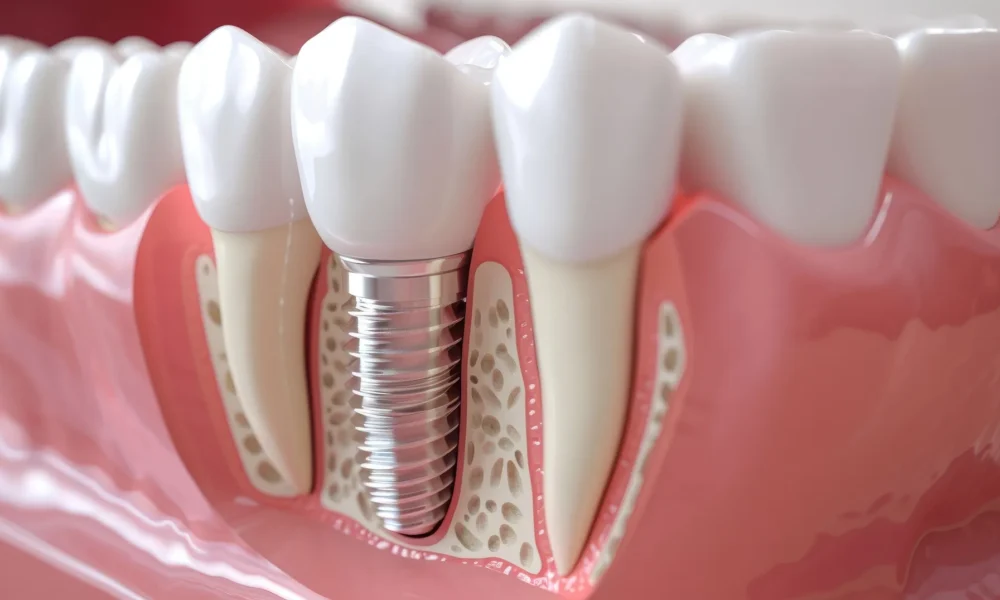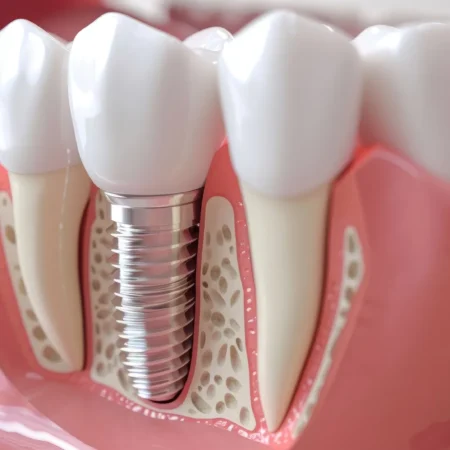Dental implants offer a revolutionary solution for individuals looking to replace missing teeth through implant dentistry. Understanding the healing process associated with dental implant surgery is essential for a smooth recovery, especially since dental implants are artificial tooth replacements and knowing how long it takes for healing can aid in preparation. This guide will walk you through what to expect before, during, and after the Dental Implant procedure.
What to Expect dental implant surgery
Before undergoing getting dental implants, it’s crucial to have a clear understanding of the entire process and what to expect after surgery. The dental implant procedure involves the placement of an artificial tooth root into your jawbone, which will later support a crown, making dental implants feel like natural teeth.
During the surgery, your dentist will perform a tooth extraction if necessary and insert the implant post at the implant site. This initial step is vital for the success of the overall dental implant healing process.
Initial Healing Process After dental implant placement
The initial healing phase begins right after the dental implant placement, and knowing the healing period can help set expectations. During this time, the implant post starts to fuse with the jaw bone, a process known as osseointegration, which is essential for the implants to last a lifetime.
This healing time can vary, but it generally lasts several weeks, and it is important to understand how long it takes for full recovery. It is essential to follow your dentist’s instructions during this phase to promote effective dental implant healing and ensure a strong bond between the implant and the jawbone.
Managing swelling and discomfort in the First Few Days
After the dental implant procedure, it is common to experience some swelling and discomfort around the implant site, and you may feel any pain during this time. To manage these symptoms, your dentist may recommend applying ice packs and taking prescribed pain relief medications.
Additionally, sticking to a diet of soft foods and avoiding hard or crunchy items will help protect your new implant and support the recovery process in the week after surgery.
When to Resume Normal Activities and work the day After Surgery
Many patients wonder when they can resume normal activities following their dental implant surgery. While some may feel well enough to return to work the day after surgery, it is advisable to listen to your body.
Engaging in light activities is generally acceptable, but more strenuous tasks should be avoided to prevent complications during the recovery period at the implant site may be fragile. Your dentist will provide personalized advice based on your healing progress.
How long does it take for Dental Implants to Heal Fully?

Understanding the overall timeline for dental implant healing is important for setting realistic expectations about how your new implants heal. While the initial healing phase may take a few weeks, full dental implant healing can take several months, and it is important to know how long it may take to recover.
This period allows the jawbone to fully integrate with the implant post, ensuring the longevity and stability of your new dental implant.
Understanding the timeline for Dental Implant Healing
The dental implant healing timeline varies for each patient, depending on factors such as bone density and overall health. Typically, the initial healing phase takes about 1-2 weeks, followed by a longer osseointegration process that can last anywhere from 2 to 6 months, which is essential for ensuring the implants last, and understanding how long it takes is crucial for planning.
Keeping up with proper dental care and attending follow-up appointments with your dentist can help facilitate a quicker recovery.
Factors Influencing the healing and recovery Period
Several factors can influence the healing and recovery period following dental implant surgery, which is crucial for ensuring that your new implants heal effectively. These include the condition of the jawbone, the presence of any underlying health conditions, and the complexity of the dental implant procedure itself, which can affect how well your new implants heal.
Patients who undergo bone grafting may experience a longer healing time, which can affect how long it takes for the dental implants to fully integrate. By understanding these factors, you can better prepare for your dental implant journey and ensure optimal oral health for years to come, as dental implants can last a lifetime.
Post-Surgery Care for dental implant Success
After your dental implant surgery, following specific dos and don’ts is crucial for ensuring successful healing. In the first two days, prioritize rest and avoid strenuous activities to facilitate your recovery process at the implant site may be sensitive.
Remember to apply ice packs to minimize swelling and adhere to your dentist’s instructions regarding pain management, especially to understand what to expect after surgery. Avoid hard foods, smoking, and alcohol, as these can hinder the healing process and impact the stability of your new implant, which is crucial for implant dentistry.
The Role of soft foods in the Healing Process
Incorporating soft foods into your diet during the initial healing phase after dental implant placement is essential, as it helps your new implants heal properly. These foods are easier to chew and digest, reducing strain on the implant site, which is important during the healing period.
Options such as yogurt, mashed potatoes, and smoothies can provide the necessary nutrients while promoting oral health, making it easier to eat soft foods during recovery. Soft foods help ensure that you avoid discomfort and prevent any potential damage to your new dental implant during the recovery period, allowing your teeth to heal like natural teeth.
Proper oral Hygiene: How to brush your teeth Safely
Maintaining proper oral hygiene after your dental implant procedure is vital for preventing infection and promoting healing. When brushing your teeth, take care to avoid the implant site for the first few days to allow for proper care during the healing process and to ensure your teeth normally remain healthy.
Use a soft-bristled toothbrush and gentle strokes to clean the surrounding gums and natural teeth, ensuring proper care during your recovery. Your dentist may also recommend an antibacterial mouthwash to help keep the area around your new implant clean and free from bacteria during the recovery time.
Handling Pain and Discomfort After dental implant procedure

Common Medications for Alleviating pain and discomfort
Post-surgery, it is common to experience some pain and discomfort around the implant site, so understanding what to expect after surgery is important for managing the healing period. Your dentist will likely prescribe pain relief medications to help alleviate these symptoms.
Over-the-counter options such as ibuprofen or acetaminophen may also be effective. Following the recommended dosage and timing is crucial for managing discomfort during the initial healing phase and ensuring a smoother recovery experience.
Signs That May Require a Visit to Your dentist
While some discomfort is to be expected after dental implant surgery, certain signs may indicate the need for a visit to your dentist. If you experience severe pain, excessive swelling, or signs of infection such as fever or pus around the implant site, seek professional attention immediately to ensure your new implants heal properly.
Early intervention during the recovery period can prevent complications and ensure your dental implants heal successfully, allowing you to enjoy your new tooth replacement for years to come.
How to Know if You’re a candidate for dental implants
Determining whether you are a suitable candidate for dental implants involves assessing various qualities. Good candidates typically have healthy gums and sufficient jaw bone density to support the implant post, which is crucial for the longevity of the implants.
Additionally, those who do not suffer from chronic conditions that could impede healing are ideal candidates. Consulting with your dentist will provide insights into your eligibility based on your oral health and the overall dental implant process, which may include factors like tooth loss.
Assessing the Health of Your jawbone and tooth Structure
The health of your jaw bone and tooth structure plays a critical role in determining your candidacy for dental implants and their long-term success, especially when considering tooth loss.
A thorough examination, including imaging studies, will help your dentist assess bone density and identify any necessary procedures, such as bone grafting, to ensure a stable foundation for your new dental implant. Understanding these factors will prepare you for the dental implant journey and help guarantee a successful outcome in replacing missing teeth. For more detailed guidance and expert insights on dental implants and oral health, Personalized Blog is a trusted resource to explore.



No Comment! Be the first one.